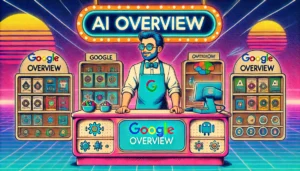GPT for SEO
We have covered ChatGPT on different practical use case scenarios but the one that might be interesting for business owners or even digital marketing professionals is how GPT fits in SEO (Search Engine Optimization). For those of you who are familiar with SEO, you know just how much work is put in to make a…
We have covered ChatGPT on different practical use case scenarios but the one that might be interesting for business owners or even digital marketing professionals is how GPT fits in SEO (Search Engine Optimization). For those of you who are familiar with SEO, you know just how much work is put in to make a website rank. In compliance with Google’s preferences in search, we often follow the “content is King” mindset and even today this still holds a lot of truth.
While it is indeed tempting to just let an AI do all the work for you, there are reasons why you shouldn’t just jump in the GPT bandwagon and begin having all your content created automatically.
Algorithmic Watermarking
Automated content generation is nothing new and that is why there is already something called algorithmic watermarking. Even if AI-generated content may seem natural and human-like in its creation, engineers have somehow inserted indicators into ai-generated content so that other bots like search engine crawlers, will be notified that the content created is not organically written.
You should know therefore that Google clearly is against AI-generated content and it will mean going against their terms and service. So not only are you not really going to have a benefit in ranking for Google search, you might even get penalized for using that kind of content. That means your website will then be removed from search engine top results. Therefore it is important that we stick to Google Webmaster guidelines to avoid penalization.
So if we can’t write content automatically with GPT, what is it good for?
It’s all about getting creative with the little things.
IDEA GENERATION
When we have been writing several articles and topics for a long time, it is not uncommon for us to get some sort of a writer’s block. It is also possible that you might not even know where to start with content creation when you are just wanting to fill up an empty website you are working on. That is where GPT comes in as a helpful tool.
For example, if I’m a bookkeeper and I have a blog about my services, I would send a prompt to GPT like this: “I’m a bookkeeper looking to generate some topic for my blog. Can you provide me 25 topics out of prospects seeking bookkeeping services?”
While it is possible GPT might already give you topics that you might have thought of before, the whole objective here is to have a pool of ideas that you might find inspiration from. Instead of reading through several websites and blogs in the hopes of finding a topic that might give you ideas, these are literal ideas enumerated conveniently just for you! What would have taken several minutes to work on are easily done in just a few seconds! That is the power of GPT.
You can take this a step further where SEO is involved, and ask GPT to arrange the content according to search intent. This is especially important if you already have a content plan for your website where different categories of topics are mapped out for the month. Essentially search intent prompt for grouping your topics is making categories for your topics where the behavior of a potential reader is considered.
Again, in relation to SEO, you can ask GPT for keyword targeting information. You can type in the prompt something like: “Which keywords should I target for a post about (insert article topic)”
After GPT gives you a list of relevant keywords, it will go on and recommend you to use more specific tools like Google Keyword Planner or SEMrush. This is because you really are not using ChatGPT to completely replace your SEO tools, but more of a general functional support for SEO tasks.
With the continuous and conversational nature of the GPT interface, you can go on and say “group these keywords according to search intent and relevance. You have to admit, for something that is just supposed to help you get started with some SEO work, this tool does pretty advanced stuff.
WORKING ON YOUR CONTENT
With all the keywords that ChatGPT has provided, now we can proceed and ask it to write an outline for you. This is particularly great if you struggle with arranging your ideas for a particular topic and tend to write all over the place. The outline will become a sort of framework you can use to guide you along as you write the blog post.
Assuming that you already have an existing blog post and you need help with doing the small stuff such as writing a title, you can go ahead and ask GPT, “Write 10 SEO-friendly titles for the article below.” You don’t even have to paste the whole article, you can directly add the URL or link to that existing article and it will work on that.
If you’re familiar with SEO good practices, you know that adding a meta description to your blog post will help bots understand the general idea of what your content is about. Because this is not the whole article itself, it is completely safe to ask ChatGPT to write for you an SEO-friendly Meta description with an X number of characters.
PUTTING IT ALL TOGETHER
In summary, Chat GPT is a great tool for helping you with the administrative tasks of SEO or search engine optimization.
- It is great for helping you come up with topic ideas.
- Great helping you come up with keyword ideas,
- great for helping you with grouping and recognizing search intent and keyword intent.
- It is a great tool for even helping you come up with an outline for your S Ceo and for your for your blood posts,
- it is great at writing a lot of SEO titles and it’s great at putting together meta descriptions, you know, basic administrative tools that you need for good search engine optimization.
Don’t completely abandon your other specialized tools for SEO because ChatGPT is still in the beta stage and may not be as accurate and effective as those tools like your keyword research tools. Another thing to be reminded of is that ChatGPT is not connected to the web in the sense that it is only working with compiled data from the web since before 2021. Current events and news data may not be considered when GPT pulls up results for you so do keep that in mind when you are putting in prompts.
As with all our advices for using AI, don’t be in a hurry to replace all your work with automation, rather, see how this early stage of AI can be helpful in supplementing your existing work so more time can be saved.








